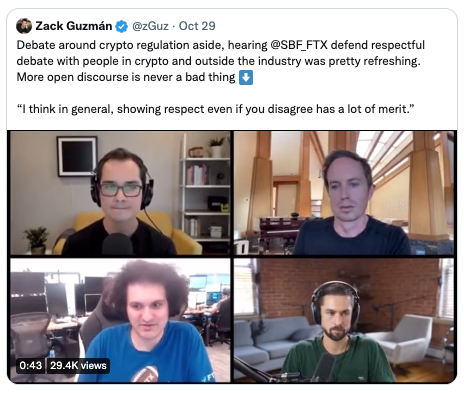In Defense of Sam Bankman-Fried
Christmas is about our better natures. The post In Defense of Sam Bankman-Fried appeared first on Bitcoin Market Journal.


Let me take you back to long, long ago in crypto history: last March.
Everyone was nuts over Sam Bankman-Fried, boy wonder. The billionaire with the unruly mop of hair. The young genius who would play videogames while giving interviews, then power lunch with Washington senators wearing cargo shorts.
Every crypto media outlet worshiped and adored Sam Bankman-Fried, and fought eagerly to get exclusive interviews with him. Even the traditional media was enamored with the self-made crypto wunderkind.
Today, these same media outlets call him a crook, a scammer, and a Ponzi-schemer. They call him Sam Bankless-Fraud. They celebrate that he was sent to (literally) a rat-infested prison.
It is hard to remember a more dizzying fall from grace. Even Icarus is like, “Damn, bro, that’s too close to the sun.”
I have a much more charitable view of what happened with SBF, and this Christmas season I encourage you to put yourself in his shoes.

Put Yourself in SBF’s Shoes
See if you can imagine yourself as a young man who’s intellectually gifted (after all, you went to MIT). You get involved with crypto in the early days, you figure out some clever ways to make money through arbitrage, and in just a few years you amass a sizable fortune.
You have no business experience and no programming experience. But the money has come so fast and so easily that you keep parlaying it into bigger enterprises. You open a crypto exchange, and now the money is really rolling in, with a commission on every trade.
As your profile grows, people start talking about you like the next Bill Gates or Mark Zuckerberg, and it does seem like that’s happening. All the fame is intoxicating, and you struggle to use your newfound power and wealth for good.
So you use your influence to make meaningful change in the crypto industry, getting involved with political lobbying and championing “effective altruism.” Those with great gifts are expected to give back for the good of all.
Meanwhile, you grow your business aggressively through marketing and advertising, and the business begins to outgrow your ability to handle it. You are vaguely aware of how much cash is going to various parts of the business, but you’ve grown so fast that much of it is hidden.
And then comes the day when you realize you have made a grave and terrible mistake. Actually, a series of mistakes: overspending, sloppy accounting, a lack of internal controls. You realize you have taken your eye off the ball, without hiring others to watch it for you.
What do you do then?

Fraud Requires Intent
I think that is what happened with SBF, and I cannot say that any of us would have behaved much differently, given the circumstances.
The meteoric rise to fame and fortune. The lack of business experience. The intoxicating hero-worship of the crypto media.
But fraud requires something else: intent.
Who among us can tell what is in another human being’s heart? But that is what a charge of fraud legally requires:
fraud (n). The intentional use of deceit, a trick or some dishonest means to deprive another of his/her/its money, property or a legal right. – Law.com
I believe SBF’s intentions were ultimately good. Here’s why.
1) He proactively worked to better regulate the industry. Everyone forgets that just before his downfall, SBF released a framework of potential digital asset industry standards.

2) SBF was a loud and vocal proponent of “effective altruism.” One of the saddest things about SBF’s downfall is that effective altruism is taking a hit, because it really is a great philosophy. It uses science and reason to figure out the ways to benefit humanity in the greatest way possible.
Effective altruism is how the Bill and Melinda Gates Foundation chose missions like eradicating malaria and getting worldwide birth control: these are achievable goals that have a massive global impact, improving millions of lives.
Effective altruism asks, Where will our time and money get the maximum return on investment for the world? It’s not just throwing money at a problem, but figuring out the best long-term investments in society.
SBF’s vision of effective altruism also had an element of personal responsibility: those of us gifted with intelligence and/or wealth have a duty to help humanity. In fact, he argued, we should make money to give it away.
Make more money, help more people.
I realize there are plenty of shady billionaires who give to charity. (And the charities are usually happy to take the money.) But there’s a difference between giving to charity and promoting a charitable philosophy.
I think SBF’s intentions behind effective altruism were sincere. For those who say it was a cover-up for a more sinister plot, I don’t think they study human nature. Most criminals are lazy (that’s why they’re criminals). Championing effective altruism would be too much work.
The effective altruism movement, like the crypto movement, has suffered in the wake of SBF’s arrest. We’re all guilty by association, so we need to work extra hard to turn that narrative around.
Effective altruism – literally, helping people in a way that’s effective – is a great idea. We should continue to champion it.
3) After his downfall, SBF kept doing interviews with one simple message: I screwed up, and I want to make it right.
Everyone knew that giving interviews was a terrible idea. You know that his lawyers were screaming at him to keep his mouth shut. But there he was in the New York Times and the Wall Street Journal, with one consistent message:
I screwed up, and I want to do right by FTX customers.
Strange message coming from someone who was no longer employed by FTX, but let’s imagine he was being sincere. Perhaps he genuinely realized the magnitude of his mistake, and was trying to take personal responsibility. (If only more of our politicians and CEOs did that.)
It’s easy to be cynical: maybe he was just trying to spin the narrative in his direction. But rather than deflecting blame, or downplaying the loss, he kept returning to the message of “I screwed up.” That, at least, is personal responsibility. It’s something our leaders don’t do enough.
A Question of Intent
I didn’t lose any money in FTX. I know many people have lost a life-crushing amount of money, and if that were me, I would feel much differently. Those people, of course, should pursue every legal remedy to get their money back. (They probably will, but it will take time.)
In the upcoming SEC vs. SBF, which will consume the headlines for months to come, the SEC will have to prove intent: that is the linchpin of their entire case. I’m sure there will be plenty of damning evidence, but who can really judge the intent in another human being?
SBF has gone out of his way to paint himself as an absent-minded quant guy who just didn’t realize where all the money was going. Even before he went on his Self-Incrimination Tour, that’s exactly what I thought. His cardinal sin was sloppy accounting.
Bad behavior must be confronted: we can’t look the other way. But we can also temper and moderate our response to it, especially when our response reflects on the entire industry. Every insult we sling at him soils all of us.
This Christmas season, let’s try to find a little generosity and understanding for Sam Bankman-Fried. Dig down and recapture some of the awe and admiration you felt for the kid just a few short months ago.
Last I heard, Christmas was about practicing our better natures. What a perfect time to practice.
Click here to subscribe to our free crypto investing newsletter and get this Sir John’s column every Friday.
The post In Defense of Sam Bankman-Fried appeared first on Bitcoin Market Journal.







